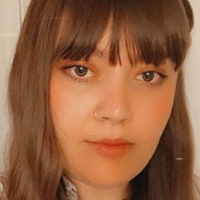
When I was in the 3rd grade, I befriended a boy who joined our class halfway through the year. He had a difficult time fitting in, to say the least, but I had always been the type of kid to embrace others eagerly. We became fast friends, our favorite pastime being movie talk. At least I thought it was our favorite pastime. It turns out it was my favorite pastime. I learned this when he confronted me mid-sentence one day with a frustrated look on his face, “Do you talk about anything other than movies?!”
Several years later, I almost followed someone off the bus at a stop that wasn’t mine because I wasn’t finished telling them one of my famous “ghost stories.” What I didn’t know then, what my family and friends didn’t know then, was that I was an autistic child.
Now, I’m an autistic adult, and all those seemingly innocuous memories are more important than ever. But I’m not here to talk about what it means to just be autistic. I’m here to talk about what it had meant to be an autistic girl and what it now means to be an autistic woman. Can you think of a single autistic woman other than maybe Temple Grandin? It’s harder than you think, but there is a reason for that, and it’s not because we don’t exist. It’s because capitalism and misogyny have made us invisible.
Who is the first autistic person that comes to your mind? Dustin Hoffman’s character from Rain Man, maybe? Sheldon Cooper from The Big Bang Theory? Both male, both fictional. The reality is, most of the public’s conception of what an autistic person is like is extremely male-centric and two-dimensional, at that. What if I told you, the way most people understand autism is harmful to women on the spectrum? The way autism manifests in men is vastly different from how it manifests in women, and because of this, women often don’t get the crucial support they need during childhood development. I lived for twenty-four years without knowing I was autistic. Many women on the spectrum have very similar stories.
One of the most prominent behaviors in autistic women is what is known as “camouflaging” or “masking.” This is the behavior of mimicking neurotypical social norms in order to conceal social disparities. To provide a little insight about how this manifests, when I enter a social situation with people I do not know, I use a different social language. This is a language I have learned by passively observing others and have practiced for years.
Think of it this way: To me, a conversation is like a jigsaw puzzle. If I want to succeed, I have to figure out which puzzle pieces to put where in order to complete the big picture.
For instance, when someone says they just got engaged, my reaction—according to interactions I’ve observed over time—should be to look surprised, smile, congratulate them, and maybe lightly touch them on the upper arm to express sincerity. Maybe I couldn’t care less whether or not this person got engaged, especially if I barely know them. But mimicking neurotypical social norms in such a way is going to provide me a much more favorable outcome than if I didn’t. By camouflaging, I have been able to (mostly) successfully follow the rules of a world I don’t quite understand. This was crucial to my social survival as a child.
Learning this behavior came at a great cost, however, and not because I am autistic, but because I did not receive the support I so desperately needed as a child. I simply did not understand what I was doing or why.
Junior high introduced a whole new complexity to social relationships. This is true for us all. But I was woefully less equipped to navigate such complexities than my neurotypical peers. I cannot tell you how many friends I lost from junior to senior high who simply, one day, decided they wanted nothing to do with me anymore. I was still nowhere near as proficient at camouflaging then as I am now, so I had a much more difficult time knowing how to manage my behaviors.
One of the behaviors I struggle with most is fixation. If I’m interested in something, I obsess over it. I’ll binge watch a TV series and then sit down at my computer and make a very detailed file system in which I will download and catalog fan art I find on the Internet. It’s also incredibly difficult to pull me away from something once I set my mind to it. Parents often didn’t like me because of this. I was a pusher. If I wanted something, I pushed and pushed and pushed until I got my way. Honestly, I was likely too intense for other kids. Which is fine. I understand now how I could have handled situations better. But the issue is, I knew none of this back then. So, when friends suddenly started ignoring me and avoiding me at all costs, it was devastating. What did I do wrong? Why won’t they at least tell me what I did? It was a vicious cycle that broke me down mentally and emotionally. Once a jubilant, eager child, I became a skeptical, depressed young adult.
When I was 18, I lost a very close friend. It happened the same way it always did. I suddenly was not a person she wanted to be around anymore. Several months later, I intentionally overdosed on sleeping medication and ended up in the hospital. I just couldn’t take it anymore. Obviously, there was something terribly wrong with me and I would never be able to figure out what it was. I had been agonizing over it for years. It was a dark time in my life. I felt completely helpless and avoided making any new friends out of fear of being hurt again. It was the one part of me I actually felt in control of.
Sometime later, I befriended someone who asked me if I was autistic. It was the first time in my life anyone had asked me such a question and I vividly remember thinking how strange it was. See, this person was autistic, and they recognized autism in me. That’s when I started reading about autism. I wish I could describe to you how it felt to recognize myself for the first time in 20 years. All my life, the world around me felt out of focus, but now I could finally see the details. It was the biggest relief I’d ever felt, but no one should ever have to experience such a sense of relief under the circumstances I did.
All too often, young autistic girls suffer the way I had. Because of the emotional trauma associated with such experiences, we are frequently misdiagnosed with mental disorders such as bipolar disorder, borderline personality disorder, paranoid personality disorder, or histrionic personality disorder, to name a few. Some women go their entire lives without knowing they are autistic. Because of this, in conjunction with the successes of camouflaging, we are systematically gaslighted from a young age.
I can’t tell you how many times I’ve heard the words, “You’re autistic? Wow, you’re so well-spoken! Are you sure?” With a single exchange, my entire existence is invalidated and erased. Yes, I’m sure. I have the scars to prove it.
Living with autism in a neurotypical world is challenging enough as it is, but throw capitalism into the mix, and there is a whole new dimension to it. With the service industry growing exponentially, the job market is evolving to select for outgoing, socially skilled workers. This makes it drastically more difficult for autistic adults to provide for themselves and live fulfilling lives.
Not only have I been autistic in a neurotypical, capitalist world all my life, but I have been female all my life. While I struggled to fit in, I was also institutionally pressured by patriarchal social values to conform to female gender norms. In consequence, autistic women are criticized much more harshly than their male counterparts regarding social behavior. We don’t have the privilege of being excused for our social missteps because of our autism the way men often are, and it’s a larger problem than you’d think.
Consequently, female autistic voices have been silenced and forced out of the autism narrative. This is unacceptable. The future of autism awareness must be about providing autistic women opportunities for their voices to be heard while simultaneously holding men (autistic men included) accountable for the way they so often push us aside. In a world that grows more and more tolerant, we need to be vigilant not to leave the underrepresented behind.
So, this is me saying I exist, I’m a woman, and I am autistic.












Comments